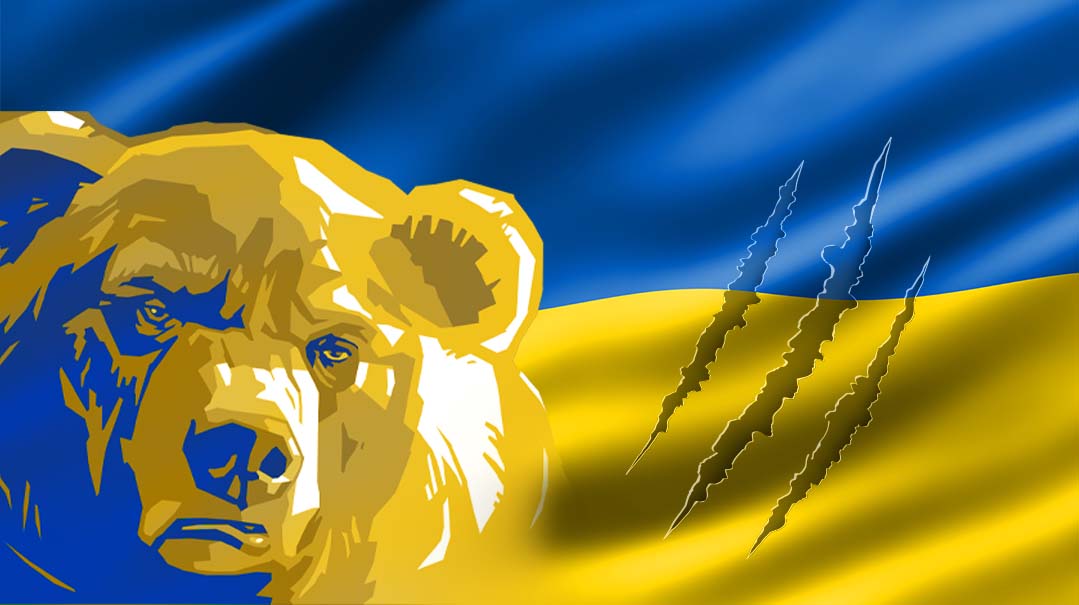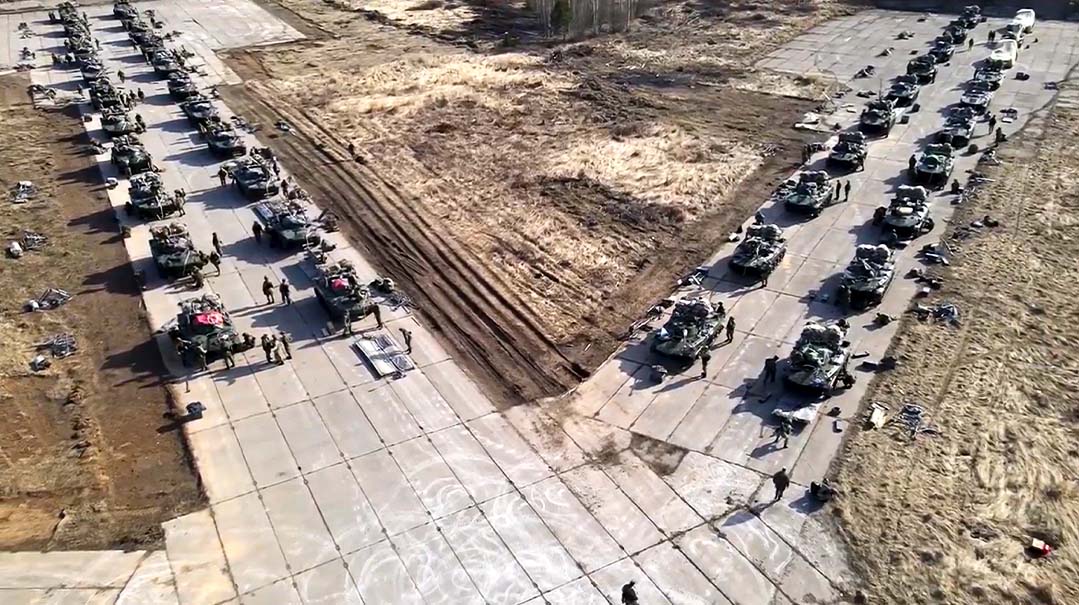A Game of Chicken Kiev

Will Ukraine escape a mauling by the Russian bear?

Over the past few weeks, alarm bells have been ringing as Russia began massing troops on its borders with Ukraine, giving all indications of initiating a land war with its neighbor. And, as of this writing, it looks like a real alarm.
The US State Department has ordered families of embassy staff in the Ukrainian capital of Kiev to leave, and President Joe Biden is considering whether to deploy thousands of troops to the Baltics.
In what looks like a lesson learned from the Afghanistan fiasco, Secretary of State Antony Blinken has been working nonstop since November, holding feverish talks with foreign ministers around the world to try to build an international coalition to deter Russian president Vladimir Putin from invading Ukraine. In the meantime, Russia has moved ground forces numbering more than 100,000 troops to the border, including the deployment of fighter aircraft and missile systems.
This isn’t the first time in recent years that the US has had to confront a crisis involving the two countries, after Russia’s 2014 annexation of the Crimean Peninsula. The question is, will the current face-off have a different outcome?
For the Biden administration, this is set to be the greatest test of its foreign policy approach since the Afghanistan pullout — although this conflict is much more significant, because it could have a domino effect on NATO allies. Meanwhile, China and Iran are taking notes. Whatever happens, it will have real ramifications on the international stage.
One might reasonably ask: Why Putin is threatening Ukraine? What’s his goal? What does he want to achieve?
“I think the motive is to intimidate the Ukrainian government and probe the unity of NATO and the Western world in general,” says Professor David R. Marples, a scholar of Russian and Eastern European history at the University of Alberta and the author of several books on Ukraine. “But I doubt there will be a full-scale invasion. More likely there will be a partial advance to gain territory in the Donbas and, possibly, the port of Mariupol.”
Marples explains that next month, Russia and its ally Belarus have scheduled a joint military exercise involving about 300,000 troops, using modern weapons.
“The exercise will take place in southwest Belarus, near the border with Ukraine, which raises the prospect of an attack from that direction,” he says. “Belarus leader Alexander Lukashenko has made it plain he will support Russian policies to ‘regain’ Ukraine — which I take to mean a Ukrainian government that is pro-Russian and linked to Russian-led entities like the Eurasian Economic Union and the Collective Security Treaty Organization (CSTO). Again, my sense is that it is unlikely to happen, but the threat is there.”

Putin Probes for Weakness
Professor Marples explains that the government of Ukrainian president Volodymyr Zelensky (who is Jewish) has been a disappointment from Russia’s perspective — it has clamped down on Russian-language media, closing one newspaper, and it has placed the most prominent pro-Russian opposition leader, Viktor Medvedchuk, under house arrest.
Marples says that the Donbas region in Ukraine’s southeast — referred to Kiev as the Donetsk and Luhansk regions — remains a flashpoint. The region’s population includes many ethnic Russians who favor transferring sovereignty to Moscow. Conflict flared up in 2014, until an armistice was reached under the Minsk Accords between Russia, Ukraine, and Western European mediators.
Putin charges that Zelensky’s government has ignored the Minsk Accords recommendation to offer some form of autonomy to the Donbas. Professor Marples says the Ukrainian army has made minor advances along the front with the Donbas region over the past two to three years.
“In addition, the time is opportune to probe the responses of the Biden administration, which is relatively new, and which has already pulled rather abjectly out of Afghanistan, just as the preceding Trump administration saw the US withdraw its forces from the Syrian conflict, while the Russians successfully backed the Syrian government.”
In short, says Marples, Moscow perceives the US as somewhat weak and vacillating. And a long-running feature of Putin’s leadership, he adds, is to create and exploit differences among the European states in their relationships with Russia. “He seeks bilateral relations whenever feasible, particularly with Germany, which has close economic links with Russia.”
But the main question is whether the US has a way to deter Russia. A military deployment to the Baltic republics, as was suggested in media reports late Sunday, would mark a dramatic turnabout from Biden’s press conference comments last week that seemed to soft-pedal any Western response to “a minor incursion,” which worried Kiev.
“The only possible response is for America to present a united front with its allies and introduce very severe sanctions,” says Marples. “Intervention in a war between two non-NATO states is inconceivable.”
Meanwhile, Marples argues, the plans that are underway for Ukraine to join the NATO alliance should be shelved.
“The NATO issue is a nonstarter, as the Russians know,” he says. “Why bring this up 18 years after the Baltic States joined? There is no prospect of Ukraine joining NATO in the near future.”
Asked whether America’s low-key response until now would be enough to deter Putin, Marples notes that the US has also sent offensive weapons to Ukraine, as well as providing training for the Ukrainian army.
“It might be enough, but my sense is that Putin and [Russian foreign minister Sergey] Lavrov may have gone too far to stand down completely,” he says. “Russia removing its troops and backing down on its demands would be akin to Khrushchev’s retreat during the Cuban missile crisis in 1962. It would result in a significant loss of prestige for the Putin leadership. In short, Russia must be seen to be gaining something by the Russian public. Its position, other than the military aspect, is not very strong.”
Don’t Count Ukraine Out
The million-dollar question of course is — if an invasion comes, what are the Ukrainians’ chances of holding their territory? The Global Firepower website ranks Russia’s army — 850,000 active duty personnel and 250,000 reserves — second in the world, right after the US. Ukraine is ranked 22nd, with 200,000 active duty personnel and 250,000 reserves.
Russia’s air power totals 4,173 aircraft (of all types), while Ukraine only has 318 aircraft. Russian superiority is also apparent with tanks (12,420 compared to Ukraine’s 2,596) and armored vehicles (30,122 compared to 12,303.)
For these reasons, military analysts believe the West has no feasible way to send Kiev enough weapons to affect the trajectory of a possible war with Moscow. However, Ukraine’s military should not be overlooked. In some respects (artillery, tanks, armored vehicles) it is ranked among the 13 most powerful armed forces in the world. It has gone through a significant upgrade since the last conflict between the countries in 2014. A possible war, some experts would argue, would be more challenging for Russia than you might think.
According to Maples, Ukrainians’ chances of holding their territory are “minimal, to be frank, though it would be very bloody and Russia could expect substantial losses.”
For weeks Washington has been aware of an apparent Russian plot to invade Ukraine through a false flag operation and install a pro-Kremlin government in Kiev. The response has been complex. On the one hand, critics will point out, Biden and Blinken have avoided open threats, and the distinction drawn by the president at a press conference last week between a full-scale invasion and annexation of a small area of Ukraine proves the US doesn’t really care, at least not sufficiently to enter a head-on confrontation with Moscow.
The counterargument is that Washington’s response has been effective on two important fronts: first of all, in exposing the Russians’ aims, which might itself be enough to avert the invasion. And secondly, Washington has managed to recruit a long list of allies to back its position, and comes to talks with Russian foreign minister Sergei Lavrov from a comfortable position diplomatically. The question is, what purpose do these talks actually serve?
Marples says that the idea of continuing discussions during the escalating tension is reasonable, “as long as these talks are not one-sided — i.e., the United States should insist that Russia pull out of Crimea and remove its troops from the eastern border, while encouraging Ukraine to provide autonomy to the Donbas.”
(Originally featured in Mishpacha, Issue 896)
Oops! We could not locate your form.






